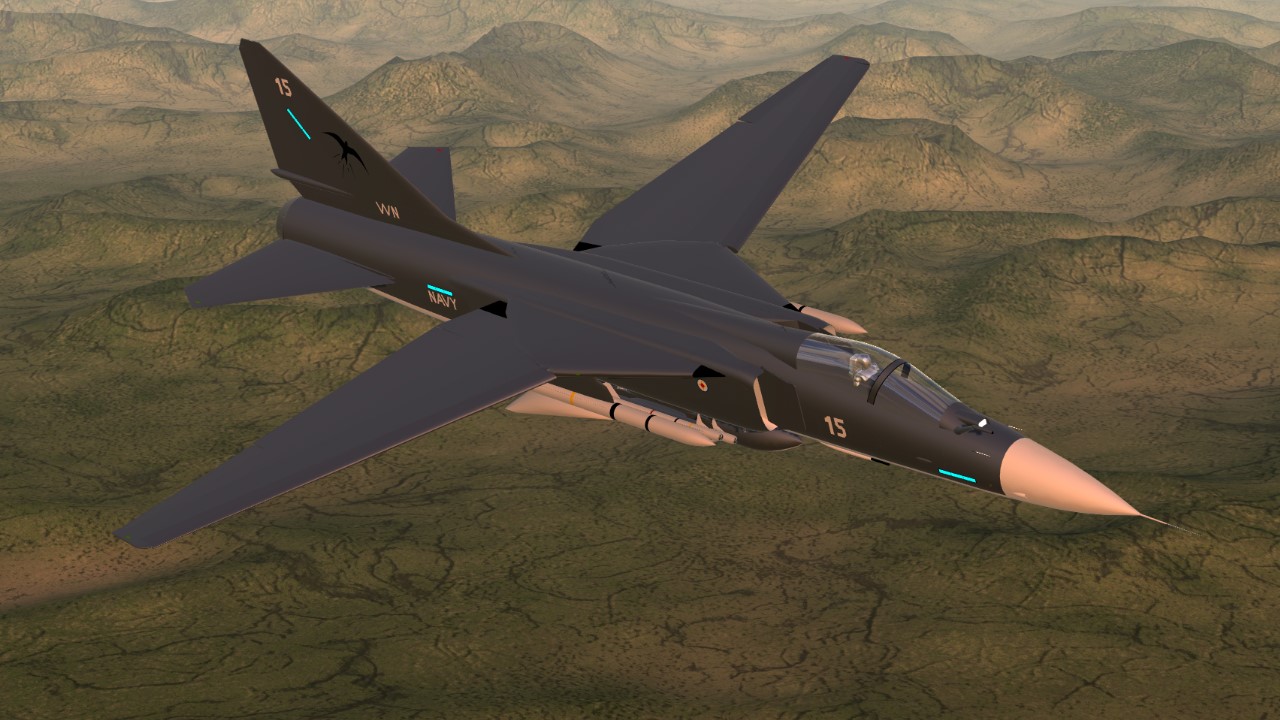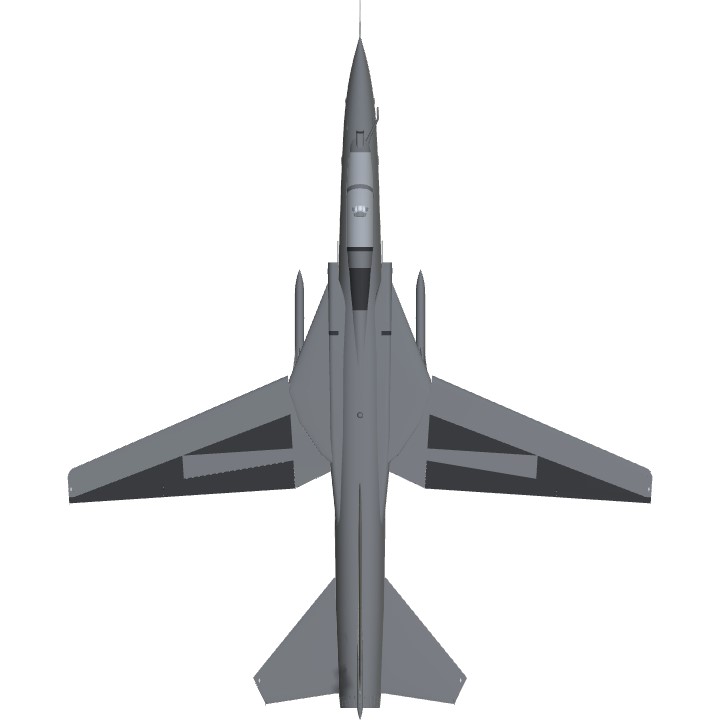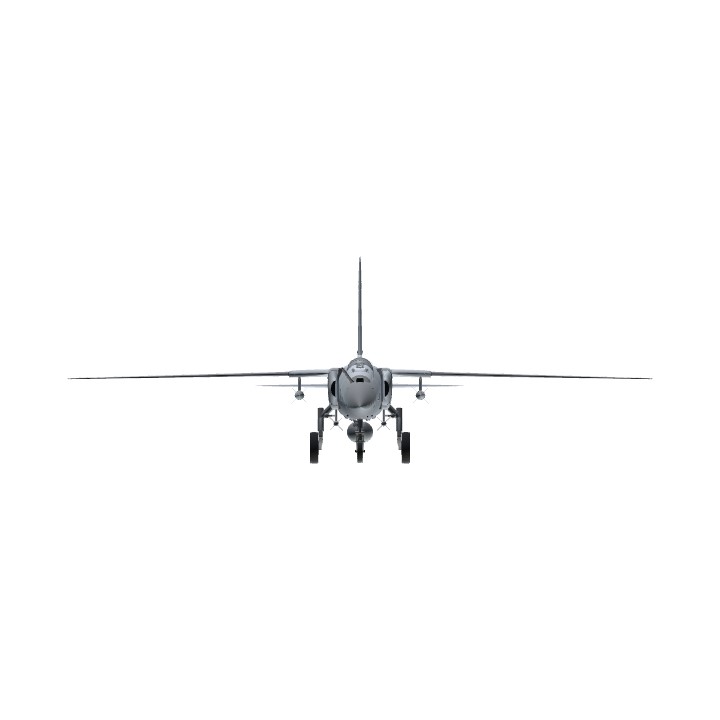
Background
The Tiran Industries NF.8 Kestrel is a Winolian supersonic, single engine variable-sweep wing multirole fighter. It was developed as part of the Winolian Navy’s FFX-V (Future fighter experimental - Naval) programme which itself was a part of a larger procurement program run by the Winolian government in the aftermath of the Winolian crisis and civil war. It incorporated many lessons from the war and was designed using new techniques and concepts. It would also be the first Winolian carrier aircraft capable of supersonic speed, the previous VFSX (naval fighter supersonic experimental) having been cancelled due to the war. It helped accelerate the development of naval aviation and would serve actively in the Winolian Navy, both atop carriers and on shore installations. It would also be modified into additional variants as it continued to serve.
Role: Interceptor, Multirole fighter
Manufacturer: Tiran Industries
First flight: 28 July, 1966
Introduction: 12 February 1970
Produced: 1965 - 1981
Number built: 423

Controls
Flight Controls
It is recommended to fly with a joystick, flight controller or mouse.
This aircraft was not designed or tested using regular WASD controls.
W - Pitch Down
S - Pitch Up
A - Roll Left
D - Roll Right
Q - Rudder Left
E - Rudder Right
SHIFT - Throttle up (80% activates afterburner, throttling to beyond 99% will activate emergency power)
CTRL or B - Decelerate and deploy airbrake
Activation Groups
AG1 - Toggle wing sweep (activating will cause wing to sweep fully above Mach 0.75)
AG2 - Navigation Lights
AG3 - Deploy arresting hook
AG4 - Jettison centre-line fuel tank
AG5 - Jettison stores (aka the panic button)
AG6 - Drag chute
AG7 - Deploy airbrakes (requires gear to be down)
AG8 - Do not use (or use at your own peril)
Normal Operations

Take-off Checklist
- VTOL UP to halfway (50%) for Flaps
- Recommended takeoff throttle: 70%+
- The nosewheel has a tendency to drift (due to an unsolved issue with the landing gear). Utilise yaw gently to stabilise the takeoff run.
- Rotation speed is approximately 150mph (241kph, 130 knots) in its current interceptor configuration).
- Pitch up to 50% (halfway pitch) at rotation speed and maintain angle until aircraft lifts off.
- Gear-Up
- Flaps will automatically retract above ~260mph(120 knots, 432 mph) but remember to reset them to 0 position (VTOL neutral)..
Carrier takeoff
- Taking off from the carrier is much simple. Attach to the catapult to begin.
- VTOL UP to halfway(50%) for Flaps
- Throttle to afterburner low (80%)
- Click the launch button and maintain pitch at about 50%.

Landing
Normal Landing
To land this aircraft, the following parameters are recommended:
- VTOL UP fully (flaps fully down)
- Landing gear down and AG7 activated (to enable airbrakes)
- Recommended landing speed at full load: Approximately 180 mph (156knots, 290kph)
- Recommended landing AoA: 10-15 degrees on touchdown
Carrier Landing
A carrier landing can be performed in much the same way but is more difficult to successfully execute. Activate 3 will deploy the arrestor hook. Maintaining a good angle of descent is essential in ensure you do not slam onto the deck.
(Currently I still find it challenging, haha)
Weapons

AAM2-R K’esiti-R

- The AAM2 - R is a semi-active, radar guided, medium-long range air to air missile.
- Standard operating procedure dictates that for maximum flight performance the missile should be employed from high altitude and long range.
The missile does not have incredible turning performance
and should not be expected to have much use in a dogfight.
It is ideally utilised at the opening stages of an engagement
to shoot down and opponent beyond visual range or force
them into a defensive position.
To fire, simple select and wait for a good lock then fire.
Max range: 42km
Effective range: 30km
Max speed: Mach 3
AAM2-I K’esiti-I

- The AAM2-I is the infrared seeking counterpart to the AAM2-I. It was designed to offer more medium range dogfight performance to the Kestrel. Its seeker was highly performant and capable of tracking and locking onto agile targets however the missiles performance was still not good in a dogfight. It was designed to offer a stealthier way to achieve a long range kill by pairing it (and slaving it) to the Kestrel’s advanced FLIR or radar.
The missile has better performance that the R but less range
as the FLIR cannot detect from the same ranges as the radar.
Max range: 25km
Effective range: 15km
Max speed: Mach 3
AAM5 Redati

The Redati was a missile developed from dogfighting experience gained during the war. Pilots stressed the need for a missile to match their expected combat parameters at close distances. They desired an agile, ECM resistant weapon. The Redati discarded older limitation, sporting a wider diameter to house a larger seeker head and more sensitive electronics. It is capable of being launched from limited all-aspect (a first in the world) and can be slaved to the aircrafts other sensors. It was developed specifically for the Kestrel and the Winolian Navy (the Air force choosing to use a different design at the time).
The missile has excellent performance at close ranges. While
its seeker aperture is not as large as that on the AAM2-I it is far
more sensitive and accurate.
Max range: 7km
Effective range: 4.5km
Max speed: Mach 2.6
CLick me! Alternative loadout and colours

Closing words
Thank you so much for downloading, upvoting, commenting and spotlighting. This has been a labour of love and I’m excited to get it out there. Feel free to offer critique and suggested improvements.
And feel free to create variants of this (tag me if you do, show off your modifications).
A massive, massive thanks goes to @Edensk who provided help, advice and technical assistance at several points during the building process. I couldn’t have done this without him, seriously.
Finally, I’ll see you on my next build.

Specifications
Spotlights
- Dimkal 3.6 years ago
- MAHADI 3.7 years ago
- RicardoACE 3.7 years ago
- TatsuTheOtaku 3.7 years ago
- Phox 3.7 years ago
General Characteristics
- Predecessor naval swing wing - Pre production airframe 2
- Created On Windows
- Wingspan 45.5ft (13.9m)
- Length 56.1ft (17.1m)
- Height 16.1ft (4.9m)
- Empty Weight 26,918lbs (12,210kg)
- Loaded Weight 34,544lbs (15,669kg)
Performance
- Power/Weight Ratio 3.252
- Wing Loading 65.2lbs/ft2 (318.6kg/m2)
- Wing Area 529.4ft2 (49.2m2)
- Drag Points 1492
Parts
- Number of Parts 1530
- Control Surfaces 1
- Performance Cost 6,285





thin flogger
in a nice way
@SkylineAero There is a glass part in the game. In the same menu as the fuselage parts.
i just know the invisible glass, how how you make it?
@FumoCirno yes. I have awakened.
he finally uploaded
.
the ancient one returns
Ok thank you@Dastin
@Tsukuyomi yeah. Although it's a couple years older than the Flogger.
mig 23 vibes to a modern extent
@Walvis many thanks.
This thing is great!
@KerlonceauxIndustries many thanks.
@TatsuTheOtaku thank you!
@PewDewEwwPew 😎 exactly. Thanks for the support.
@asteroidbook345 <. < >. > hush. No Flogger here. Thanks for the support.
@Mostly a perfect fusion.
@Giantwhale I'm not at all a funky trees expert. And honestly, it's not necessary until you get quite advanced. You can build good looking and good flying builds without it it. People did and still do. Then you can utilise some basic Funky trees code to improve your builds once you've gotten your quality improved.
However,if you're dead set on using funky trees prematurely there are places such as the funky trees guide. Still, I'd advise against it for now. Focus on learning to build better first.
Ok, I was also wandering how to utilize funky trees? Any guidance on that? @Dastin
Mig 23 : Who are you?
•
•
•
FN.9 Kestrel : I'm you, but cooler 😎
Hey look a MiG-23
MiG-23 meets Mirage G
@Kangy it's a little janky. It'll extended to a position where it should be attached while speed is lower than a certain threshold and the gear is down. My future plan is to have it actually know its on the carrier (probably by using a narrow altitude band) to make it more accurate.
Noice
@Dastin I did spot it after I made my comment lol
I can't fly it but does it extend for the catapult?
@Kangy Ah wait, its not very visible from the pictures but in the iso side view its there.
@Kangy I don't know if you mean something different but if you look on the nosewheel there is indeed a catapult bar. It functions but its a bit of a pain to set conditions where it should/shouldn't be in deployed position. I limited it to just a speed and gear controlled machination for the time being.
If you mean something different please send me an example. I'd love to know.
@Giantwhale In two word: Iteration & imitation
By that I mean, learning from those around me, copying their styles (of course without stealing anything) and then developing my own methods from what I see/learn.
It's a mix of passion for aviation, patience and practice. A lot of my planes don't make it onto the site, haha. Feel free to download what I make and tinker with it. If it helps you learn/improve I'm happy with it.
Just uh, don't repost my build and claim it as your own. That's all I ask.
@Dastin Fair calls there mate!
For something like this one thing that would be cool is a launch bar for carrier ops, they take around 10 - 15 minutes to engineer and complete but let me tell you, they look amazing when they pay off!
I do think that landing lights would brighten this build up a bit too when the gear goes down.
Anywho that's just my opinion, keep up the good builds mate!
How do you make such good planes